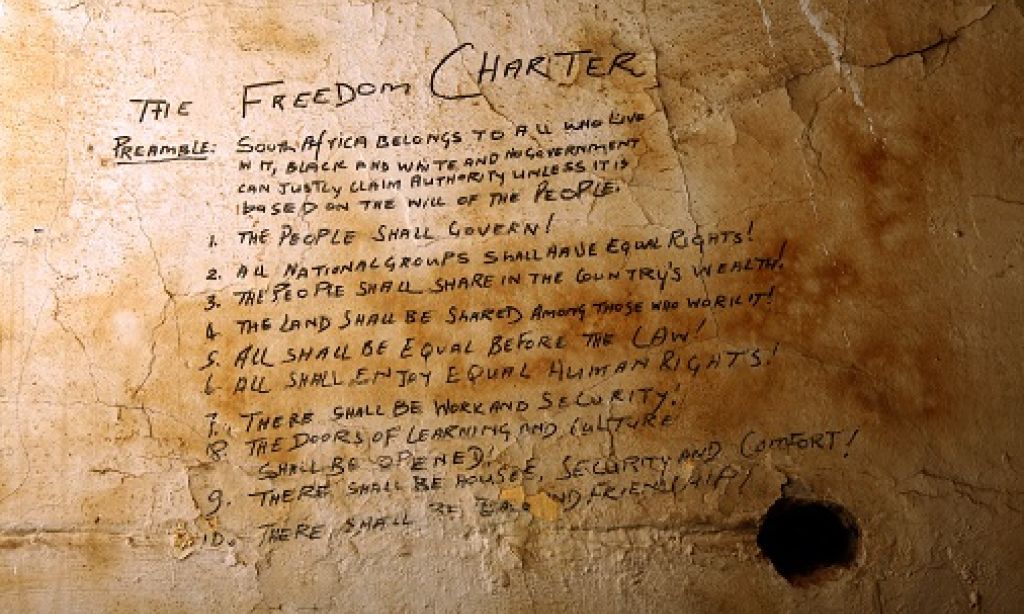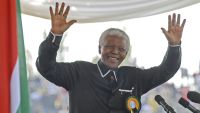Nelson Mandela was arrested on several occasions and stood trial four times. He spent over 27 years in prison. Our archivists and researchers have assembled dates and locations of transfers and time spent in confinement.
Prison numbers
- 19476/62 – Pretoria Local Prison 7 November 1962
- 11657/63 – Pretoria Local Prison 1963, when he returned to Pretoria after a short spell on Robben Island
- 466/64 – Robben Island June 1964
- 220/82 – Pollsmoor Prison March 1982
- 1335/88 – Victor Verster Prison 7 December 1988
Trials and prisons chronology
2 December 1952
Nelson Mandela is charged, with 19 others, including Walter Sisulu, for violating the Suppression of Communism Act. They are convicted and sentenced to nine months' hard labour, suspended for two years.
21 March 1960
Sixty-nine peaceful protesters are killed by police at Sharpeville. On 30 March Mandela is one of thousands detained under a state of emergency.
8 April 1960
The apartheid regime bans the African National Congress (ANC) and the Pan Africanist Congress (PAC).
29 March 1961
After a four-and-a-half-year trial, where he and scores of other people were charged with high treason, Mandela and the last 27 remaining accused are acquitted. He goes underground.
11 January 1962
Mandela leaves the country for military training, and to gather support for the newly formed armed wing of the ANC, Umkhonto we Sizwe (Spear of the Nation).
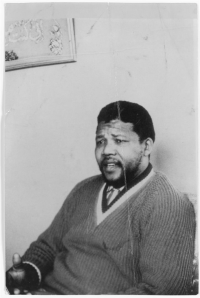
Nelson Mandela was known as the Black Pimpernel when he went underground in 1961.
(Image: Courtesy of Azher Saloojee)23 July 1962
Mandela returns to South Africa via Botswana.
5 August 1962
He is arrested at a roadblock near Howick, KwaZulu-Natal.
7 November 1962
He is sentenced to five years in prison, for incitement and leaving the country illegally. He begins serving his sentence at Pretoria Local Prison and is assigned the prisoner number 19476/62.
27 May 1963
Transferred to Robben Island Prison.
12 June 1963
Transferred to Pretoria Local Prison.
9 October 1963
Appears, for the first time, with 10 others in the Palace of Justice in Pretoria. They become the accused in the Rivonia Trial. The case is remanded to 29 October.
“ I have fought against white domination, and I have fought against black domination. I have cherished the ideal of a democratic and free society in which all persons live together in harmony and with equal opportunities. It is an ideal which I hope to live for and to achieve. But if needs be, it is an ideal for which I am prepared to die. ”
Accused:
- Nelson Mandela
- Walter Sisulu
- Govan Mbeki
- Ahmed Kathrada
- Raymond Mhlaba
- Denis Goldberg
- Elias Motsoaledi
- Rusty Bernstein
- Bob Hepple
- Andrew Mlangeni
- James Kantor
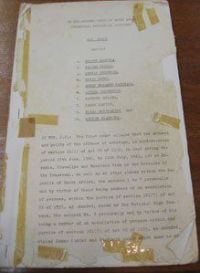
A document from the Rivonia Trial that forms part of Ahmed Kathrada’s archival materials at the Robben Island Museum Mayibuye Archives.
29 October 1963
The defence applies for the quashing of the indictment, which alleges 199 acts of sabotage.
30 October 1963
Prosecutor Percy Yutar announces that Bob Hepple is to become a state witness. He is released and skips the country. The indictment against the 10 others is quashed. They are immediately rearrested.
1 November 1963
Justice Quartus de Wet refuses bail to Kantor and Bernstein. The case is remanded to 12 November.
12 November 1963
Yutar presents a new indictment splitting the sabotage charges into two parts. The case is remanded to 25 November.
25 November 1963
The 199 alleged acts of sabotage are reduced to 193. The defence applies to have the new indictment quashed.
26 November 1963
Justice De Wet dismisses the application to have the indictment quashed.
27 November 1963
The trial is remanded to 3 December, after Kantor’s new defence requests time to prepare.
“ Real leaders must be ready to sacrifice all for the freedom of their people. ”
3 December 1963
The 10 accused plead not guilty to sabotage in the Rivonia Trial.
4 March 1964
Kantor is discharged and released.
20 April 1964
Mandela makes his famous "Speech from the Dock", in which he says he is "prepared to die" for a democratic South Africa.
11 June 1964
All, except Bernstein, are convicted of sabotage.
12 June 1964
Mandela and seven others are sentenced to life imprisonment.
12 June 1964
All except Goldberg are sent to Robben Island to serve their sentences. Goldberg, as the only white person convicted in the trial, is held in Pretoria Central Prison. Mandela is assigned the prisoner number 466/64.
24 September 1968
Mandela’s mother, Nosekeni dies. He is forbidden from attending her funeral.
13 July 1969
Mandela’s eldest son, Thembekile, is killed in a car accident. Mandela is forbidden from attending his son's funeral.
31 March 1982
Mandela, Sisulu, Mhlaba and Mlangeni, and later Kathrada, are transferred to Pollsmoor Prison. Mandela is assigned the prisoner number 220/82.
10 February 1985
Rejects President PW Botha's offers to release him and other political prisoners if they renounce violence.
28 February 1985
Goldberg, who has been held apart from his comrades for more than 20 years, accepts the offer and is released.
3 November 1985
Mandela admitted to the Volks Hospital in Cape Town for prostate surgery.
23 November 1985
Is discharged from the Volks Hospital and held in a cell alone at Pollsmoor Prison, from where he begins communicating with the government about eventual talks with the ANC.
16 May 1986
Meets with an Eminent Persons Group from the Commonwealth Group of Nations.
20 July 1986
Holds his first meeting with Justice Minister Kobie Coetsee about talks between the government and the ANC.
5 November 1987
Govan Mbeki is released from Robben Island.
12 August 1988
Mandela admitted to Tygerberg Hospital, where he is diagnosed with tuberculosis.
31 August 1988
Transferred to Constantiaberg Mediclinic to continue his treatment.
7 December 1988
Is transferred to Victor Verster Prison near Paarl, where he is held in the house formerly occupied by a warder. Mandela is assigned the prisoner number 1335/88.
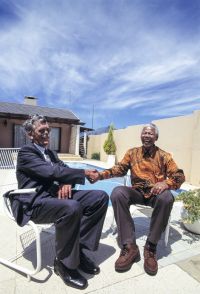
Nelson Mandela meets one of his warders at the cottage at Victor Verster Prison where he stayed until his release in 1990.
(Image: © Louise Gubb)5 July 1989
Meets PW Botha in his office in Cape Town.
15 October 1989
Sisulu, Kathrada, Motsoaledi, Mlangeni and Mhlaba are released, along with Oscar Mpetha and PAC prisoner Jeff Masemola.
13 December 1989
Meets President FW de Klerk at his office in Cape Town.
2 February 1990
At the opening of Parliament, De Klerk announces the unbanning of all political organisations, including the ANC.
10 February 1990
Meets De Klerk, who says he will be released the next day in Johannesburg. Mandela objects, saying he wants to walk through the gates of Victor Verster Prison, and asks for two weeks for the ANC to prepare. De Klerk refuses the extension but agrees to release him from Victor Verster.
10 February 1990
De Klerk announces at a press conference that Mandela will be released the next day.
11 February 1990
Mandela is released from Victor Verster Prison.
11 February 1990
He addresses thousands of well-wishers gathered on the Grand Parade, from the balcony of the City Hall, in Cape Town. Spends the night at Bishopscourt, the official residence of the Anglican Archbishop of Cape Town.
12 February 1990
Holds a press conference in the garden of Bishopscourt. Flies to Johannesburg.
12 February 1990
Spends the night in North Riding, at the home of a supporter, Sally Rowney.
13 February 1990
Flies to FNB Stadium in Soweto for a welcome home rally.
13 February 1990
Spends his first night in decades at his family home, 8115 Orlando West, Soweto.
